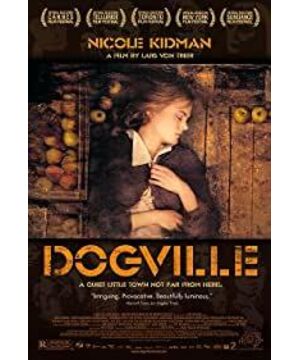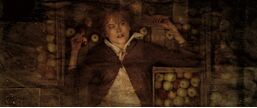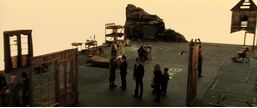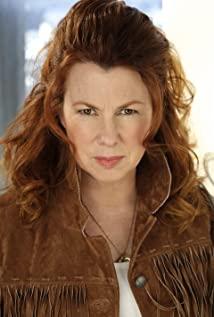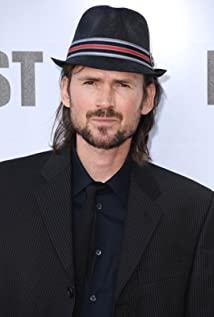watched Lars von Trier (Lans Von Trier) in "Dancer in the Dark" and "Europa" Soon, be have a little understanding of his film and photographic arts advocate. When watching his latest work "Dog Town", I feel that I can be a little more detached. After all, "Dancer in the Dark" and "Europa" are both representative in his "Conscience Trilogy" and "European Trilogy". However, there are no exceptions to his films. "Dogtown" still made me quickly ignore his ingenious stage play form and pay more attention to his plot, although the plot still needs a lot of supplementary stage dialogue. As an attempt to express the art form of a new film, the director has indeed achieved ingenuity. I believe that my essay will be inadequate, but it can be regarded as a bit of a bit of personal viewing. After all, the ability to immerse me in a movie for nearly three hours twice means that it is extraordinary.
Second, good and evil field experiments
to explore human nature is always a concern for Lars von Trier (Lans Von Trier) film performance of the theme, the film is to explore the differences between good and evil reaches a hearty Extremely pleasant. "The more depraved, the happier", the contrast between good and evil of human nature is magnified in this condensed world film. My eyes almost have the illusion of watching the nematode twisting under a microscope while watching it. In "Dog Town", goodness is just a kind of contract behavior deep in the human soul. It is destined to require both parties to abide by the detailed regulations and punishment regulations for breach of contract liability. Dogtown is a laboratory of two powers. On the one hand, it is the desire of human kindness that Tom Edison needs to prove; on the other hand, it is the reality of human nature that Grace needs to accept. The two sides of the contest are carefully designed by the director. This unique little town. It’s called Dog Town, even though it only has a dog named Moise; it’s a closed town, and despite the hardships, life still has to go on; it has very few residents, they have simple jobs and a meager income, This income is not even enough to maintain the democracy that Americans have always been proud of and proud of. They referred to this small town as a "group", and they have a very good habit of meeting all of them to vote on something. Although everyone has different attitudes towards life and views towards the town, they still live together. The change of things happened after Therese came to this small town...
As I said before, I was amazed at the director’s boldness at the beginning of the film. It was just a stage: a chalk-painted house without walls or even a door. All house furnishings were simplified to the utmost and screened out. Extra props have always been one of Trier's film propositions. The director's arrangement for the film also adopts the structure of classical drama, divided into overtures and nine chapters. Each chapter has a clear theme and is interdependent. The meetings of the town residents after Grace's appearance are used as the connection of the divided chapters. Let me first briefly introduce the two main characters in the movie:
Grace: the daughter of the gang boss. She has a beautiful appearance and a kind inner world. As her father said, she has high moral standards. It can be seen from two things in the movie. The first time she stole the bone from Moise’s kennel on the night she fled to the town. For this reason, she kept blaming herself in front of Tom. Another point was her desire and persistence for love. It shows that she has good moral restraint. For humanity, she always has good expectations. After entering the town and receiving the residents of the town, she has only one purpose for all her actions, and that is to stay in this place and "stay". When devastated by the continuous escalation of the residents of the small town, she has a kind of endurance and survival consciousness that is almost animal instinct. "A generous God has given her this kind of talent: just look forward." She was unwilling to accept the inheritance proposed by her father, so she chose to flee; however, in the laboratory where she believed that human nature was good, she was exposed to this group of seemingly kind but ugly faces. Therefore, such a change is only a result of her experiment, so it is very easy to understand that she finally accepted and pained the killer.
Thom: The philosopher in the small town, even though he has nothing to do, he regards the study of human souls and spreading goodness as his profession and enjoys it. Just when he needed to prove the kindness of the small town group, God gave him a gift he dreamed of in a timely manner—Grace, a weak woman who seemed to need help, needed his love to save, and there was nothing better than this. It is more meaningful to him, even he thinks that his love for Grace is a kind of salvation for her. "Like a spider in a cobweb", his own hypocrisy and ugliness have always consciously or unconsciously imposed compulsive demands on Grace, despite the two high-sounding excuses of salvation and love. He never discarded Grace’s father’s business card. It was a kind of selfishness that he wisely saved his life. He excused his love for Grace and hoped to achieve the purpose of possessing Grace in the flesh. Even after being seen through by Grace, he proposed to hand Grace to Grace. Going out in exchange for more practical benefits is enough to show that his essence is as ugly as everyone in this town.
Third, the good is a commercial activity
signed the first contract is Thom order to prove good and strongly defend this "sample" of conservation value. At the meeting on whether to teach kindness or not, Thom believed that leaving Grace is the best time to test the group's "love for others", "I am not based on what has happened, but on what will happen. ". The content of the contract is very simple: time, two weeks; everyone in Dogtown will not sell Grace, and Grace needs to work one hour a day in each family in exchange for the dangerous cost they need to bear; two weeks later, as long as small There was a person in the town who didn't accept her and she needed to leave. The drafter is naturally Thom, as they said: the game begins. And Grace has already begun to feel the brilliance of humanity in the small town. "The small town has begun to appear a scene of small changes." She and Thom also got an opportunity to testify and experiment, related to "tolerance, coexistence, harmony and love." "Theme of.
The climax of kindness occurred in a vote two weeks later. Grace returned to her room to prepare to leave, only to find that many people had already sent gifts: a map drawn by Tom, Gloria’s pie, Jason's knife, Massa's Bible, and even a dollar bill. She even thought that she finally realized the brilliance of human nature and the meaning of her existence. But to everyone's surprise, the residents of the small town passed her right to continue living unanimously, and even started a very happy time. The first four of the nine chapters finally went well, and the turning point has already begun. Ironically, the director chose the National Day of the United States as the fifth chapter. This day is a watershed, and the transformation of good and evil begins on this day. .
The second contract started when the police posted a notice stating that Grace was not only missing, but a robbery suspect two weeks ago. Although everyone in the town knows that it’s impossible, but in terms of the risks that need to be taken, “silence means crime”. From a business perspective, they mean paying more expensively. Therefore, the contract stipulates Grace’s compensation measure is to work two hours a day for each family. As for the two people who conducted the experiment, they still insisted that "stay is the winner." Even though they have begun to sway, Grace even said that she is willing to accept everything, as long as they confirm that they still let her stay, "to avoid everything being ruined." But the nightmare started...
Chuck raped Grace by threatening to report to the police; Ben even used the report as a means to offer Grace’s dedication in exchange for her dedication, "Dangerous cargo transportation prices." It’s more expensive. We call it the asking price.” And in the end, Ben took her back to the town; she took the charge of Tom’s theft of ten dollars from his father and was locked up like an animal. The woman in the town He and the child began to use the humiliation of her as a means of exchange, and the man touched her room in the middle of the night. Compared with the first four chapters, the ugliness and despicability of human nature in the last four chapters came so quickly that Grace's remaining hope for conscience and kindness fell to pieces with the only clay figure she wanted to cherish. And Tom still wears a kind mask, hoping to use another kind of hypocrisy to achieve the purpose of possessing her, but after being stripped off by her, he turns into anger. People seem to be like dogs, and it is an instinct to demand more and more, reflecting so strongly.
"We can teach dogs many useful things, but we cannot forgive them for every instinctive reaction." Kindness as a human contract behavior was finally confirmed. It turned out to be just an illusion. A person's kindness requires more effort from others. In return, when you finally have the right to take advantage of the contract terms, it seems that trampling on the weak will become a natural behavior. However, "everyone should be responsible for their actions, and you should give them this opportunity." Grace's father finally let her understand that the original expectations and requirements for humanity are just a kind of "stupidness" in her heart. bias". Dogs are doglike. "When they greedily eat their vomit, the only way to stop them is to whipping." Since kindness is just a contract, when I have the right not to sign, then I give up. Since democracy can also be discarded, there is nothing left that cannot be discarded. Besides, Grace knew that when she herself was a member of this small town, her behavior should be the same...
There were a dozen corpses on the stage, and the car slowly drove away. Suddenly, it turned out to be just one The chalk drawing of the dog turned into a real dog, Moys began to bark, and there seemed to be moonlight at night...
4. "Counter-back to America"
Lans Von Trier's mockery of the United States He has offended many film companies, but in the first part of the "American Trilogy", he still did not try to hide his aversion to American society. The background of the film is set in the 1930s in the United States, the renunciation of democracy by the residents of small towns, the ugliness of human nature, and the pictures of the suffering lives of American miners that have appeared from the beginning of the National Day, and even at the end of the film. The metaphor in "Dancer of the Dance" is more obvious and thorough. In "Dancer in the Dark", the tragedy of BJORK also illustrates the unfair treatment of weak but sincere European immigrants in the United States. I think we should accept Trier as a member of the Communist Party in recognition of his great contribution to countering American politics and culture. Haha, this is a digression, not to mention that Trier has publicly declared that he is not a socialist, but This still cannot conceal the attack on the United States in his works. Let's wait and see the last two of his "American Trilogy"...
View more about Dogville reviews


